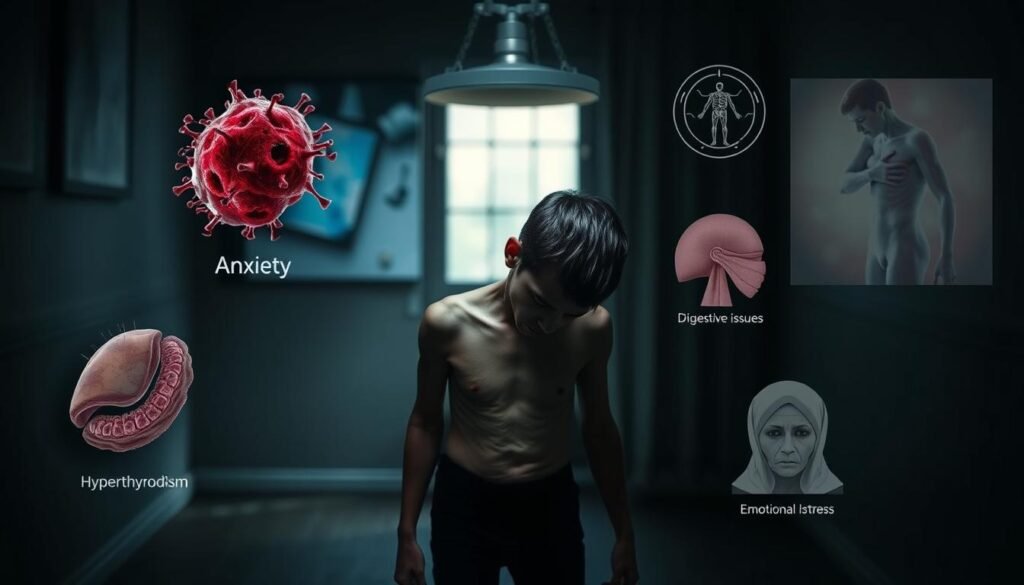Did you know about 40% of people report unexplained weight loss when diagnosed with cancer? This fact shows why it’s key to know the signs linked with unexplained weight loss. It might point to weight loss anxiety or even cancer. Many factors can cause unexpected weight loss, like stomach issues or mental health concerns such as depression and anxiety. It’s vital to tell harmless causes apart from serious health problems. Weight loss could be a sign of a severe condition. So, understanding the signs linked to weight loss anxiety and cancer is important. This knowledge, plus early detection, can help people get the help they need for their health.
Key Takeaways
- Unexplained weight loss can signal serious health issues, including cancer.
- Not all cases of weight loss are cancer-related; many conditions contribute.
- Contact a healthcare provider if experiencing more than 5% weight loss in 6-12 months.
- Mental health is intricately linked to weight fluctuations.
- Identifying and treating underlying causes is essential for recovery.
- Monitoring weight changes regularly can help detect issues early.
Understanding Unexplained Weight Loss
Unexplained weight loss happens when someone loses weight without dieting or exercising. It’s worrying if someone loses 10 pounds or more, or if they lose more than 5% of their original weight in six to twelve months. This could be a sign of health issues, even serious ones like cancer.
Some cancers, especially in the stomach, pancreas, esophagus, or lungs, show themselves through weight loss. Cancer boosts the body’s energy needs, making it burn calories faster. This can lead to weight loss even if the person eats normally.
Cancer can affect how the body works, changing how it uses energy and leading to weight loss. Problems with eating due to cancer in the mouth or throat, or side effects from cancer treatments, can make this worse. These treatments can make people feel sick or lose their appetite.
Feeling stressed or anxious because of cancer can also make it hard to eat or feel energetic. It’s important for people to watch their health closely and get help if they notice unexpected weight loss. Finding and treating problems early can make a big difference.
The Connection Between Weight Loss and Cancer
Many people notice unintentional weight loss as one of the first signs of cancer. It’s revealed that 31% to 87% of cancer patients lose weight unexpectedly before being diagnosed. This is often more than 10 pounds. Cancers of the pancreas, stomach, esophagus, and lung are most linked to these symptoms.
Several reasons explain weight loss in cancer patients. The disease can cause inflammation, increasing metabolism and changing hormone levels. Pain and treatments like chemotherapy make eating hard due to appetite loss, mouth, and throat sores. Nausea from chemotherapy adds to the difficulty of eating.
Conditions like early satiety make patients feel full after a small meal. This can be due to treatments or the tumor’s effects on hormones. Feelings of depression and anxiety also play a role in weight loss among cancer patients. In advanced stages, up to 80% experience cancer cachexia, leading to significant weight loss and contributing to a third of cancer-related deaths.
To fight weight loss, experts suggest eating small meals often and using supplement drinks. They advise focusing on foods high in calories and protein. When keeping weight on is hard, tube feeding or vein feeding may be used.
| Factor | Impact on Weight Loss |
|---|---|
| Cancer Type | Specific cancers like pancreatic, stomach, esophageal, and lung often lead to significant weight loss. |
| Inflammation | Changes in metabolism and hormone levels can accelerate weight loss. |
| Chemotherapy | Side effects such as nausea and mouth sores frequently result in decreased appetite. |
| Psychological Factors | Depression and anxiety can lead to further appetite loss, exacerbating weight issues. |
| Cachexia | A condition affecting up to 80% of advanced cancer patients, leading to drastic weight loss and increased mortality risk. |
Common Types of Cancer Associated with Weight Loss
Unexplained weight loss often points to serious health problems. Many cancer types link to this sign. Studies show between 31 and 87 percent of cancer patients undergo significant weight loss without trying. Weight loss is common in cancers of the pancreas, stomach, esophagus, and lungs. Knowing these cancers helps catch them early, which improves treatment outcomes.
Cachexia, or “wasting” syndrome, impacts up to 80 percent of those with advanced cancer. It’s linked to around one-third of cancer deaths. People with cachexia have lost more than 5 percent of their weight over six months. Or, they might show severe muscle loss and have a body mass index (BMI) below 20.
Weight loss is a key symptom, but there are other signs to watch for. Be aware of ongoing tiredness, appetite changes, and trouble swallowing. Recognizing these symptoms along with weight loss could lead to quicker consultation with a doctor. This is crucial for anyone concerned about cancer.
| Type of Cancer | Weight Loss Symptoms |
|---|---|
| Pancreatic Cancer | Significant weight loss, abdominal pain |
| Stomach Cancer | Loss of appetite, nausea, early satiety |
| Esophageal Cancer | Difficulties swallowing, weight loss |
| Lung Cancer | Unexplained weight loss, chronic cough |
| Ovarian Cancer | Sensation of fullness, digestive issues |
Knowing the types of cancer and their signs, like unexpected weight loss, is vital. It leads to faster medical help. Early detection can make a big difference in treatment success. Thus, being aware of cancer and its symptoms is a key part of staying healthy.
Other Causes of Unexplained Weight Loss
Unexplained weight loss can come from many places, not just cancer. Knowing all possible causes is critical for right evaluation and care. Significant weight loss might hint at health issues.
Some chronic illnesses that cause weight loss are:
- Depression
- Anxiety disorders
- Chronic infections, such as AIDS
- Gastrointestinal diseases like celiac disease and chronic pancreatitis
- Eating disorders, including anorexia and bulimia
- Undiagnosed diabetes
- Hormonal disorders like hyperthyroidism

Some meds, like cancer treatment drugs, thyroid meds, and stimulants, may cause weight loss. The American Cancer Society says losing 10 pounds or more could mean health problems.
In older adults, unexplained weight loss is more common. Studies show 15% to 20% of older people may lose weight without a clear reason. It’s important to talk to doctors if you lose a lot of weight quickly.
Getting checked out by a doctor is key. They will look at your history, what you eat, and your life to find the cause. If weight loss comes with other symptoms, seeing a doctor can help find and fix any health issues.
Weight Loss Anxiety: Recognizing the Signs
Weight loss anxiety can happen when people change how they eat. It’s important to know if the worry is from the mind or body. Look for signs like fixating on food, changing how much you eat often, and worrying a lot about your shape.
Feeling anxious can make you eat less or pick unhealthy foods. Stress might make you skip meals, leading to more weight loss. If stressed for a long time, you might feel stomach pain or heartburn, which are signs of more anxiety.
- Being obsessed with weight and looks.
- Changing how or what you eat and exercise.
- Not feeling hungry or missing meals.
- Stress affecting what you do every day.
- Avoiding friends because you feel bad about yourself.
To tackle weight loss anxiety, support is crucial. Eating regularly helps improve mood and health. Try setting reminders to have small, healthy snacks. This helps keep your mind and body in good shape.
When trying to manage weight, avoid sugary or junk food. Choose meals full of nutrition instead. Go for foods high in protein and good carbs. This helps keep your weight steady while dealing with difficult emotions.
Spotting and acting on weight loss anxiety signs is important. It helps you stay physically and mentally balanced. This leads to a better way of handling stress and keeping a healthy weight.
Effects of Mental Health on Weight and Appetite
Mental health deeply affects weight and appetite. Depression, anxiety, and stress can change what we eat. This can lead to losing or gaining weight unexpectedly. Studies have found that people with obesity often feel more depressed. This makes it harder to manage their weight.

How we feel can affect how we eat. During tough times, some eat more for comfort. This is called emotional eating. It can mess up both how much and what we eat. Understanding these psychological factors is key. They need to be addressed for any treatment to work.
Lots of things can change our appetite, like what we eat and our mental health. Eating too much sugar and salt could make us feel more depressed. Yet, eating vitamins A and B6 may help protect us. A balanced diet is important for feeling good and managing weight. Also, keeping our gut healthy helps. Foods with probiotics can help with anxiety and keeping a healthy weight. Learn more about how our gut and brain are connected in this article.
Weight Loss Anxiety or Cancer: When to Seek Medical Attention
If you lose more than 5% of your weight in 6 to 12 months without trying, it’s time to worry. This could mean something serious is going on. Older folks with health issues should watch out for any weight loss. It might show problems that need checking out.
At first, a doctor might just watch your health for 1 to 6 months. They do this if they don’t find a clear reason for weight loss. Scans for hidden cancers aren’t usually done first unless there are other worrying signs. But staying on top of things is key.
Doctors might ask for blood and urine tests to learn about your health. Depending on what they find, you might need more checks. If your bowel habits change suddenly, it could mean an infection. That needs a doctor’s look.
Feeling very confused or having trouble concentrating are signs to talk to a doctor right away. These symptoms could be because of dehydration, infections, or mental health issues. They need quick action. Also, getting full too quickly or always being tired might point to stomach problems or cancer. These symptoms need checking.
Knowing when to get medical help is important for your health. Being quick to act on these issues is good for you.
Coping Strategies for Managing Weight Loss Anxiety
Dealing with anxiety from losing weight needs different coping ways. These ways aim at building a healthy lifestyle. It is key to mix mental health care and physical activity for those facing these troubles.
Talking to a therapist is big in sorting out weight loss anxiety. It lets people dig into their worries. Getting therapy offers ways to handle anxiety. This includes guided imagery, mindfulness, and cognitive behavioral therapy.
Mindfulness keeps you in the now and cuts down on bad thoughts. Deep breathing and meditation can calm you down. This makes it easier to deal with anxiety.

Being active is good for mind and body. Exercise helps with weight and lifts your spirits by releasing endorphins. Trying out walking, stretching, or yoga regularly can help.
Talking and spending time with others helps a lot. Being with friends or groups gives a feeling of togetherness. It helps to share your story with those who get what you’re going through.
In the end, finding coping ways that fit you is key. Staying healthy with a good diet, exercise, and support helps you tackle weight loss anxiety well.
Support Groups and Resources for Emotional Well-Being
Support groups help people facing challenges like weight loss or cancer. They provide a space where people can connect over shared experiences. This community support makes health journeys easier.
Organizations like the American Cancer Society offer crucial programs for cancer patients. Their 24/7 helpline is available at 1-800-227-2345. Hope Lodge® offers free lodging for those getting treatment far from home. Programs like ACS CARES™ give personal support and information.
The Road To Recovery program helps with transportation to treatments. This removes a big obstacle for many patients. The Cancer Survivors Network lets patients and caregivers share stories. The Reach To Recovery program connects breast cancer patients with survivors.
Support groups come in different formats. Some are free and peer-led, while others may be run by professionals and cost money. Online groups offer flexibility but may miss face-to-face interaction’s depth. Being aware of any technical issues is important.
| Support Resource | Description | Contact Information |
|---|---|---|
| American Cancer Society | 24/7 helpline for cancer support and information. | 1-800-227-2345 |
| Hope Lodge® | Lodging assistance for cancer patients. | Available through ACS |
| ACS CARES™ | Patient and caregiver support program offering information and one-on-one support. | Access through ACS |
| Road To Recovery | Transportation assistance for cancer treatments. | Contact ACS for arrangements |
| Cancer Survivors Network | Online platform for support and sharing experiences. | Visit ACS website |
| Reach To Recovery | Connects breast cancer patients with survivor volunteers. | Available through ACS |
Support groups highlight the importance of taking care of your emotions. They teach self-care and coping skills, spreading hope. Rules ensure privacy and support healthy discussions.
Support groups are crucial for emotional health, helping patients and caregivers alike. They offer a sense of belonging and understanding. This helps everyone feel they’re not on this journey alone.
Conclusion
Losing weight without trying could mean health problems, even cancer. People should watch for unexpected weight changes. If you lose more than 5% of your body weight quickly, get help. This could point to serious conditions like certain cancers.
Weight loss impacts how we feel mentally, too. Knowing how body weight and disease are linked helps us take care of our health. We need to look at both what we think and the real numbers of our body weight. The effects of losing weight without trying are highlighted in a study, which you can see here.
It’s scary to lose weight unexpectedly, but we can manage many health changes. Talking with doctors and using resources helps us stay on track. It ensures we tackle health issues early and with confidence.